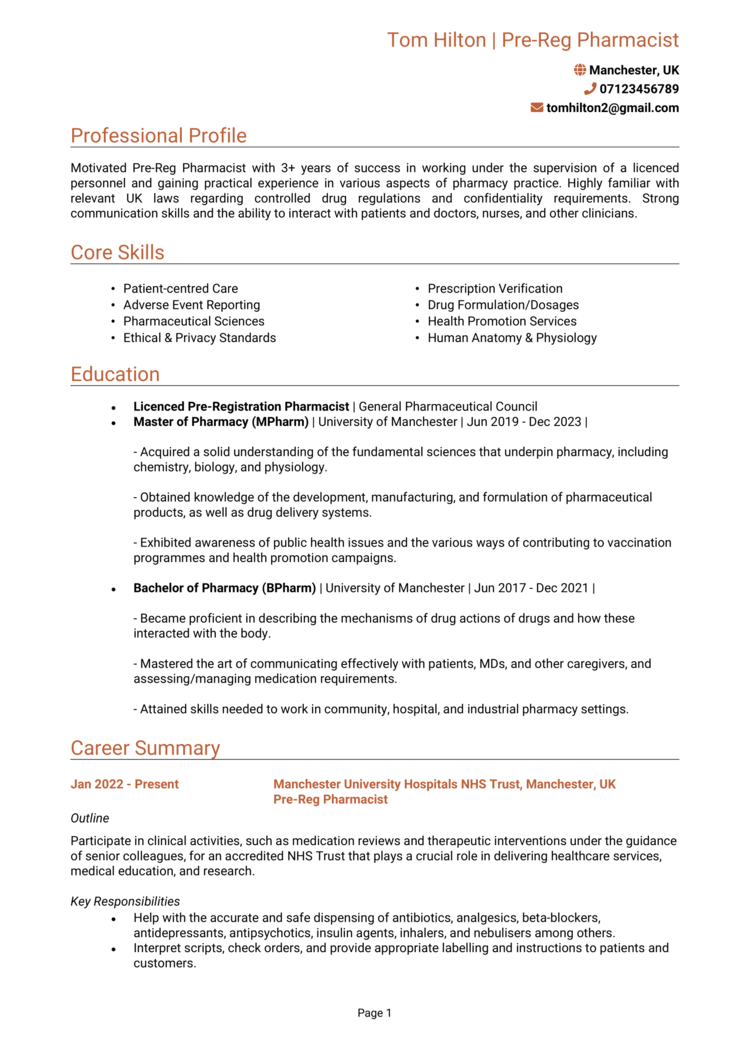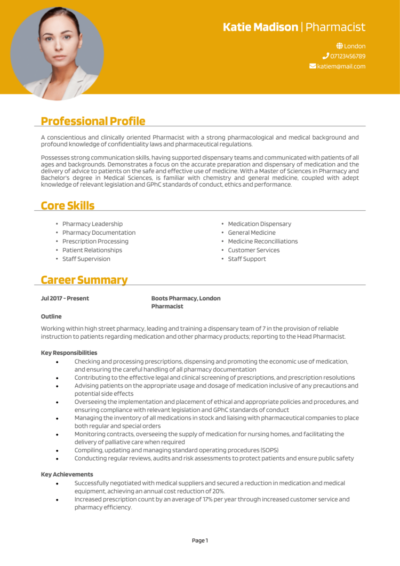You’re the expert who ensures patients get the right meds, but now it’s time to prescribe yourself the perfect CV. It’ll need to highlight your expertise, build trust, and get you noticed by healthcare employers.
Think of this guide as your professional dosage – it’s all you need to create a CV that cures any doubts a recruiter might have. Along with 2 Pharmacist CV examples, you’ll be writing a CV that brings you closer to the perfect role in pharmacy.
Pharmacist CV example

Pre-Reg Pharmacist CV example

How to write your Pharmacist CV
Learn how to create your own interview-winning Pharmacist CV with this simple step-by-step guide.
A Pharmacist CV needs to showcase your pharmaceutical knowledge, attention to detail, and customer care skills. Employers want to know you’re capable of handling prescriptions, offering sound advice, and maintaining patient safety.
This guide will teach you how to write a good CV that gets interviews, lands jobs, and sets you on the path to a rewarding pharmacy career.
The best way to structure your Pharmacist CV


Your CV structure should be as precise as a prescription – well-organised, clear, and full of the right details. Recruiters need to quickly see your qualifications, experience, and the value you bring to their pharmacy.
Here’s how to structure your Pharmacist CV:
- Name and contact info – Keep contact details at the top so hiring managers can reach you. You’re able to add a picture of yourself, but it’s always optional.
- Profile – Start with a summary of your pharmaceutical expertise, customer focus, and standout skills.
- Core skills – Bullet point your key abilities, such as medication management, patient counselling, and regulatory compliance.
- Work experience – List your pharmacy roles in reverse chronological order, focusing on your contributions and impact.
- Education – Show off your academic qualifications like your MPharm degree and professional certifications.
- Additional info – In this optional section, you can include hobbies and interests that reflect your dedication to healthcare or your community, along with relevant awards.
Pharmacist CV format


Your CV format should mirror the professionalism and precision you bring to pharmacy work. A clean, well-organised layout ensures your skills and expertise shine through, rather than distracting the recruiter with formatting mistakes.
Effectively format your Pharmacist CV with these tips:
- Bullet points – Break down responsibilities and achievements into easy-to-read snippets.
- Divide sections – Clearly separate key areas to help recruiters navigate your CV quickly.
- Use a clean font – Prioritise readability with a professional font and a tidy layout.
- Keep it the right length – Two pages are ideal – enough length to showcase your expertise while respecting the reader’s time.
Writing a Pharmacist CV profile


Your profile (or personal statement for junior candidates) is like the patient information leaflet – it gives a quick overview of everything important and leaves a positive impression.
It’s the introduction that convinces recruiters you’re the pharmacist they need. It should summarise your expertise, specialisms, and the value you bring to a pharmacy team.
Pharmacist CV profile examples
Profile 1
Experienced Pharmacist with six years of experience in community pharmacies, specialising in patient consultations, medication dispensing, and ensuring compliance with NHS guidelines. Skilled in delivering personalised care and providing advice on minor ailments, contributing to improved patient outcomes.
Profile 2
Dedicated Hospital Pharmacist with four years of experience in clinical settings, focusing on managing inpatient medications and collaborating with multidisciplinary teams. Proficient in conducting medication reviews, ensuring accurate dosages, and providing drug interaction guidance to enhance patient safety.
Profile 3
Proficient Pharmacist with over eight years of expertise in industrial and regulatory pharmacy. Skilled in quality control, regulatory compliance, and developing strategies to ensure the safety and efficacy of pharmaceutical products. Successfully led a team to achieve ISO certification for manufacturing standards.
What to include in your Pharmacist CV profile
Here are some tips on what to include in your Pharmacist CV profile:
- Where you’ve worked – Say which types of community pharmacies, hospitals, or other healthcare settings you’ve contributed to.
- Your top qualifications – Ensure you highlight your MPharm degree and any relevant certifications.
- Key expertise – Quickly note your experience with medication safety, patient counselling, or regulatory compliance.
- Customer care focus – Mention your ability to provide exceptional service to patients and their families.
- Notable achievements – Reference key accomplishments, like reducing dispensing errors or improving patient outcomes.
Core skills section


Your core CV skills section is your pharmaceutical toolkit – showcasing the abilities that make you an invaluable asset to any pharmacy team. Tailor this section to align with the role’s specific requirements, whether it’s a high-volume pharmacy or a more patient-focused environment.
What are the most important skills for a Pharmacist CV?
- Prescription Processing – Accurately interpreting and dispensing prescriptions while ensuring compliance with regulations.
- Medication Management – Advising patients on the correct usage, dosage, and storage of medications.
- Pharmacological Knowledge – Comprehensive understanding of drug compositions, interactions, and therapeutic effects.
- Compounding Medications – Preparing customised medications based on individual patient needs and prescriptions.
- Patient Counselling – Providing guidance on managing health conditions and promoting adherence to treatment plans.
- Inventory Control – Monitoring and managing stock levels to ensure the availability of essential medications.
- Regulatory Compliance – Ensuring adherence to legal and ethical standards in pharmaceutical practices.
- Health Screening Services – Conducting services such as blood pressure checks, vaccinations, and health consultations.
- Clinical Collaboration – Working with healthcare professionals to optimise patient care and treatment outcomes.
- Pharmacy Software Proficiency – Using systems like RxNorm or EPOS to manage prescriptions, inventory, and patient records.
Work experience


Your work experience section is where you demonstrate your ability to handle the demands of a pharmacist role. Focus on how your experience has benefited patients, improved operations, or enhanced safety.
Writing job descriptions for past roles

- Outline – Provide a brief description of the pharmacy or healthcare setting and your role within it.
- Responsibilities – Highlight key tasks, such as managing prescriptions, advising patients, or ensuring compliance with regulations.
- Achievements – Include measurable outcomes, like improving patient satisfaction scores or streamlining inventory management. Include plenty of numbers in your CV to really make an impact.
Example jobs for Pharmacist
Pharmacist | Healthplus Pharmacy
Outline
Managed the daily operations of a busy community pharmacy, delivering patient-focused services and ensuring accurate dispensing of prescriptions. Supported NHS initiatives and contributed to public health education.
Responsibilities
- Dispensed medications accurately, ensuring compliance with legal and professional standards.
- Conducted consultations to provide patients with tailored advice on minor ailments and over-the-counter products.
- Managed stock levels, including ordering and storing medications securely.
- Collaborated with GPs and healthcare providers to resolve prescription queries.
- Organised health awareness campaigns, including flu vaccinations and smoking cessation programs.
Achievements
- Increased patient satisfaction scores by 20 percent through enhanced customer service.
- Administered 1,000+ flu vaccinations annually, contributing to community health goals.
- Recognised by management for consistently achieving error-free prescription dispensing.
Hospital Pharmacist | CityCare General Hospital
Outline
Provided clinical pharmacy services in a busy NHS hospital, focusing on patient safety and effective medication management. Worked closely with medical staff to optimise treatment plans.
Responsibilities
- Reviewed and validated prescriptions to ensure accurate dosages and appropriate therapy.
- Participated in ward rounds with doctors and nurses to provide medication-related advice.
- Prepared intravenous medications, including chemotherapy, in sterile environments.
- Educated patients on post-discharge medication use and potential side effects.
- Maintained up-to-date knowledge of clinical guidelines and new pharmaceutical developments.
Achievements
- Reduced medication errors by 15 percent through thorough prescription reviews.
- Contributed to a hospital-wide initiative that improved patient safety indicators by 25 percent.
- Trained junior pharmacists and interns, enhancing team knowledge and skills.
Pharmacist | Pharmalife Labs
Outline
Worked in a pharmaceutical manufacturing environment, ensuring product quality and compliance with regulatory standards. Focused on quality control and the development of safe and effective medications.
Responsibilities
- Oversaw the production process to ensure adherence to Good Manufacturing Practices (GMP).
- Conducted quality control tests on raw materials and finished products.
- Prepared and submitted regulatory documentation to meet MHRA requirements.
- Collaborated with R&D teams to refine drug formulations and improve efficacy.
- Implemented standard operating procedures (SOPs) to enhance production consistency.
Achievements
- Achieved ISO 9001 certification for quality management within six months.
- Reduced production waste by 20 percent through process optimisation.
- Played a key role in the successful launch of three new pharmaceutical products.
Education section


The education section is crucial for a pharmacist’s CV to show you’ve got the brains to back up your expertise.
Outline everything from your MPharm degree, pre-registration training, and any additional certifications like prescribing qualifications. For new pharmacists, highlight academic projects or internships that showcase your potential.
Always list qualifications in reverse chronological order, starting with the most recent.
Qualifications recruiters look for in a Pharmacist
- MPharm Degree – The essential qualification for practicing as a pharmacist, covering pharmacology, patient care, and clinical skills.
- General Pharmaceutical Council (GPhC) Registration – Required to practice as a licensed pharmacist in the UK.
- Independent Prescribing Certification – Demonstrates authority to prescribe medications autonomously.
- Pharmacy Technician Certification – Adds value to pharmacists looking to mentor or manage technicians.
- First Aid at Work Certification – Highlights readiness to respond to emergencies in healthcare settings.





